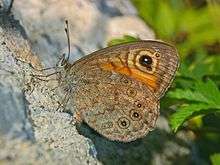Lasiommata maera
| Lasiommata maera | |
|---|---|
 | |
| Lateral view | |
| Dorsal view | |
| Scientific classification | |
| Kingdom: | Animalia |
| Phylum: | Arthropoda |
| Class: | Insecta |
| Order: | Lepidoptera |
| Family: | Nymphalidae |
| Genus: | Lasiommata |
| Species: | L. maera |
| Binomial name | |
| Lasiommata maera | |
Lasiommata maera, the large wall brown, is a butterfly in the family Nymphalidae.
Subspecies
- Lasiommata maera maera
- Lasiommata maera abastumana (Sheljuzhko, 1937) (Caucasus)
- Lasiommata maera adrasta (Hübner, [1823-1824]) (from south western Europe to Morocco and Algeria)
- Lasiommata maera crimaea (A. Bang-Haas, 1907)
- Lasiommata maera jachontovi (Sheljuzhko, 1937) (Caucasus)
- Lasiommata maera meadewaldoi (Rothschild, 1917) (Morocco)
- Lasiommata maera ordona (Fruhstorfer, 1909) (Siberia)
- Lasiommata maera orientalis (Rühl, 1894) (Armenia)
Distribution and habitat
The species is common in continental Europe. It is also present in the Urals, south western Siberia, Asia Minor, Syria, Iran, Central Asia and the Himalayas.[1] It is absent from the United Kingdom.[2] Its preferred habitats are edges of the forest, unmanaged clearings on forested areas, rocky dry areas and stony slopes, at an elevation of 0–2,000 metres (0–6,562 ft) above sea level.
Description
Lasiommata maera has a wingspan of 44–56 millimetres (1.7–2.2 in).[3] These large butterflies are quite variable in color and pattern. Usually the upperside is orange in the forewings and mostly brown in the hindwings. The forewings always show a single ocellus, while the hindwings bear two or three ocelli. The underside of the forewings is orange and the underside of the hindwings is marbled with gray brown.[4] This species is quite similar to Lasiommata megera, that is smaller and has paler yellow-orange forewings.[5]
Biology
The larva eats full-grown grasses, such as Poa annua, Poa bulbosa, Poa pratensis, Festuca ovina, Festuca rubra, Festuca pratensis, Glyceria fluitans, Calamagrostis epigejos, Calamagrostis arundinacea, Calamagrostis varia, Deschampsia flexuosa, Agrostis capillaris, Nardus stricta, Dactylis, Lolium and Hordeum species.[1]
This species has two broods in the northern countries, a single brood in the south. Adults fly from April to September.[5] These butterflies are avid fliers and they are seldom seen in flight in strong wind.
Gallery
- Male
- Female
External links
References
- 1 2 3 "Lasiommata Westwood, 1841" at Markku Savela's Lepidoptera and Some Other Life Forms
- ↑ Fauna europaea
- ↑ Butterfly Guide
- ↑ Papillions de Poitou-Charentes
- 1 2 Eurobutterflies Eurobutterflies
| Wikispecies has information related to Lasiommata maera |
| Wikimedia Commons has media related to Lasiommata maera. |